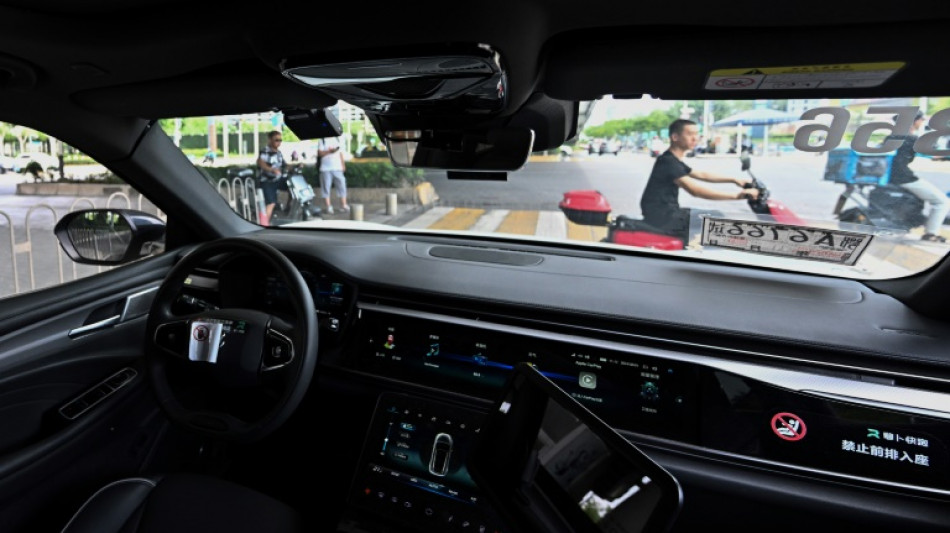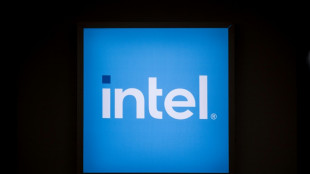
-
 Indian army says new exchange of gunfire with Pakistan
Indian army says new exchange of gunfire with Pakistan
-
Epstein accuser Virginia Giuffre takes own life in Australia: family

-
 Hundreds of buildings damaged, dozens injured in 6.3 Ecuador quake
Hundreds of buildings damaged, dozens injured in 6.3 Ecuador quake
-
India and Pakistan's Kashmir fallout hits economy too

-
 Francis's funeral to be grand farewell to 'pope of the poor'
Francis's funeral to be grand farewell to 'pope of the poor'
-
Pogacar faces defiant Evenepoel at Liege-Bastogne-Liege

-
 Chelsea eye great escape against Barcelona in Women's Champions League
Chelsea eye great escape against Barcelona in Women's Champions League
-
Iran, US to hold new round of high-level nuclear talks

-
 'Energy and effort' pay off for Reds as Blues' woes continue
'Energy and effort' pay off for Reds as Blues' woes continue
-
Albatross and closing birdie lift China's Liu to LPGA Chevron lead

-
 On the horizon? Wave of momentum for high seas treaty
On the horizon? Wave of momentum for high seas treaty
-
Developing countries should fast-track US trade deals: World Bank president

-
 Grizzlies' Morant 'doubtful' for must-win game 4 v Thunder
Grizzlies' Morant 'doubtful' for must-win game 4 v Thunder
-
Trump in Rome for pope funeral in first foreign trip of new term

-
 Trump says Russia-Ukraine deal 'very close' after new Kremlin talks
Trump says Russia-Ukraine deal 'very close' after new Kremlin talks
-
US rookies lead PGA pairs event with McIlroy and Lowry in hunt

-
 Trump tariff promises get a reality check
Trump tariff promises get a reality check
-
Warriors coach Kerr 'relatively optimistic' injured Butler will play game 3

-
 Postecoglou hopes 'Stonecutter's Credo' can inspire Spurs
Postecoglou hopes 'Stonecutter's Credo' can inspire Spurs
-
PSG lose unbeaten Ligue 1 record ahead of Arsenal showdown

-
 Venezuela accuses El Salvador president of 'human trafficking'
Venezuela accuses El Salvador president of 'human trafficking'
-
Own goal takes Sundowns to African final against Pyramids

-
 Scores of buildings damaged, 20 injured in Ecuador quake
Scores of buildings damaged, 20 injured in Ecuador quake
-
US stocks extend rally as market eyes busy calendar next week

-
 Pope's death triggers surge of disinformation he fought against
Pope's death triggers surge of disinformation he fought against
-
Rovanpera takes control of Rally Islas Canarias

-
 Zelensky insists Crimea is Ukrainian as US envoy meets Putin
Zelensky insists Crimea is Ukrainian as US envoy meets Putin
-
Patel and Mendis help Sunrisers beat Kings in Dhoni's 400th T20

-
 Copa del Rey ref statements 'unacceptable': Real Madrid after boycotting final build-up
Copa del Rey ref statements 'unacceptable': Real Madrid after boycotting final build-up
-
Insurance CEO's accused killer pleads not guilty to federal murder charges

-
 FBI arrests Wisconsin judge for shielding undocumented migrant
FBI arrests Wisconsin judge for shielding undocumented migrant
-
Brazil ex-president Collor de Mello jailed for corruption

-
 Zelensky insists Crimea 'belongs' to Ukraine as US envoy meets Putin
Zelensky insists Crimea 'belongs' to Ukraine as US envoy meets Putin
-
Real Madrid boycott Copa del Rey build-up over referee complaints

-
 Trinidad and Tobago votes for parliament, PM, with opposition in lead
Trinidad and Tobago votes for parliament, PM, with opposition in lead
-
IMF chief hails 'constructive' Spring Meetings held under tariff uncertainty

-
 Iran FM Araghchi in Oman ahead of nuclear talks with US
Iran FM Araghchi in Oman ahead of nuclear talks with US
-
Dozens of buildings destroyed, 20 injured in Ecuador quake

-
 Young Barca must 'enjoy' Real Madrid Copa final fight: Flick
Young Barca must 'enjoy' Real Madrid Copa final fight: Flick
-
Pakistan and India border closure separates families

-
 Brazil's Bolsonaro 'stable' after post-surgery setback
Brazil's Bolsonaro 'stable' after post-surgery setback
-
Catholics in secular Cuba hail Francis as 'bridge'

-
 US envoy Witkoff, Putin discuss 'possibility' of direct Russia-Ukraine talks
US envoy Witkoff, Putin discuss 'possibility' of direct Russia-Ukraine talks
-
Community seeks answers after French school knife killing

-
 German prosecutors seek jail terms in VW 'dieselgate' trial
German prosecutors seek jail terms in VW 'dieselgate' trial
-
Sabalenka makes winning start at Madrid Open

-
 EU, US should de-escalate and negotiate trade deal: IMF Europe director
EU, US should de-escalate and negotiate trade deal: IMF Europe director
-
Russia accuses Ukraine of killing general in car bombing

-
 Emery wants FA Cup glory and Champions League berth for Villa
Emery wants FA Cup glory and Champions League berth for Villa
-
Buildings destroyed, one injured in Ecuador quake


China's growing 'robotaxi' fleet sparks concern, wonder on streets
Turning heads as they cruise past office buildings and malls, driverless taxis are slowly spreading through Chinese cities, prompting both wariness and wonder.
China's tech companies and automakers have poured billions of dollars into self-driving technology in recent years in an effort to catch industry leaders in the United States.
Now the central city of Wuhan boasts one of the world's largest networks of self-driving cars, home to a fleet of over 500 taxis that can be hailed on an app just like regular rides.
At one intersection in an industrial area of Wuhan, AFP reporters saw at least five robotaxis passing each other as they navigated regular traffic.
"It looks kind of magical, like a sci-fi movie," a local surnamed Yang told AFP.
But not everyone shares Yang's awe.
Debate around safety was sparked in April when a Huawei-backed Aito car was involved in a fatal accident, with the company saying its automatic braking system failed.
A minor collision between a jaywalker and a Wuhan robotaxi last month re-ignited concerns.
Taxi drivers and workers in traditional ride-hailing companies have also raised fears of being replaced by artificial intelligence -- although the technology is far from fully developed.
- Five to 500 -
Wuhan's driverless cabs are part of tech giant Baidu's Apollo Go project, which first received licences to operate in the city in 2022.
Initially only five robocars ferried passengers around 13 square kilometres (five square miles) of the city of around 14 million.
Baidu says the taxis now operate in a 3,000 square kilometre patch -- more than a third of the total land area of Wuhan, including a small part of the city centre.
In comparison, US leader Waymo says the largest area it covers is 816 square kilometres, in Arizona.
When a car reaches its pickup point, riders scan a QR code with their phones to unlock the vehicle -- with the front seats blocked off over safety concerns.
The fares are currently heavily discounted, with a thirty-minute ride taken by AFP costing just 39 yuan ($5.43) compared with 64 yuan in a normal taxi.
"They are stealing our rice bowls, so of course we don't like them," Wuhan taxi driver Deng Haibing told AFP, using a popular Chinese term for livelihoods.
Deng said he fears robotaxi companies will push traditional drivers out of business with subsidised fares, before raising prices once they achieve domination -- similar to the strategy employed by ride-hailing apps in the 2010s.
"Currently the impact isn't too big because robotaxis aren't fully popularised and can't drive everywhere yet," Deng said.
- 'Simply not ready' -
The robotaxi fleet is a tiny fraction of the tens of thousands of taxis and ride-hailing cars in Wuhan.
More and more Chinese cities are rolling out policies to promote self-driving services though, part of a national push for tech supremacy.
Baidu and domestic rival Pony.ai have for years tested models of varying autonomy levels in industrial parks around the country.
Shanghai issued its first batch of provisional permits for fully driverless cars last month, and the capital Beijing has approved fully autonomous robotaxis in suburban areas.
The southwest city of Chongqing and southern tech hub of Shenzhen also have pilot projects underway.
Technology wise, there's still a long way to go before self-driving taxis become ubiquitous though, according to Tom Nunlist, tech policy analyst at Trivium China.
"Everybody seems to think autonomous driving is inevitable at this point, and frankly, I don't know that it is," he told AFP.
"Presently fully autonomous driving tech is simply not ready for large-scale deployment," he said.
Even in Wuhan's Apollo Go taxis -- which can spot obstacles and wait scrupulously at intersections -- ultimate responsibility for safety still lies with human officers monitoring rides remotely.
During one ride in an Apollo Go car, one manipulated the car's built-in touchscreen to remind AFP reporters to put on their seatbelts.
"Safety personnel provide strong assurances for your ride via remote 5G assistance technology," the Apollo Go app tells users.
Robotaxis are also far from able to replicate the human touch.
"Some customers have disabilities and (driverless cars) definitely wouldn't be able to help them, and some passengers are carrying large items," ride-hailing driver Zhao told AFP.
"Only a human can help."
Ch.Kahalev--AMWN



